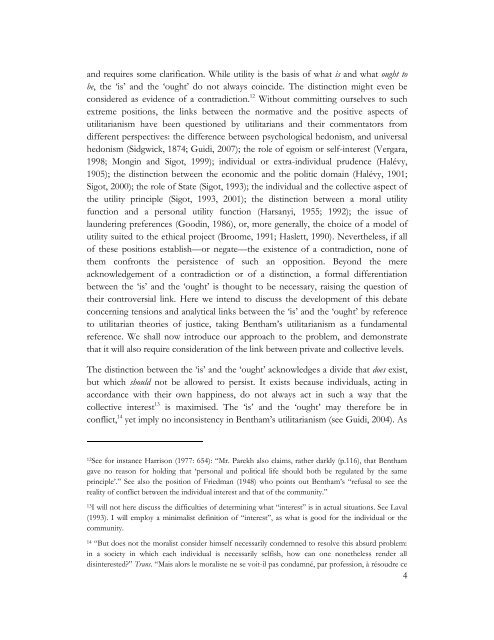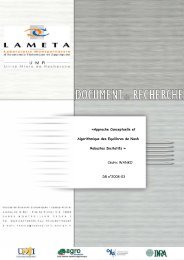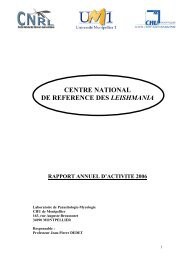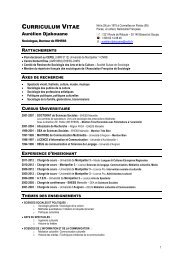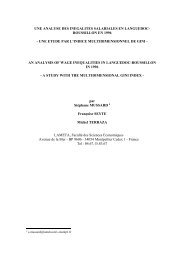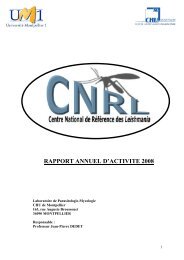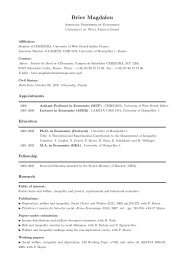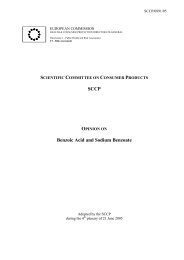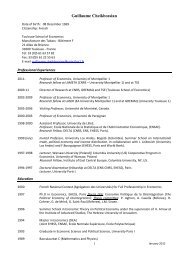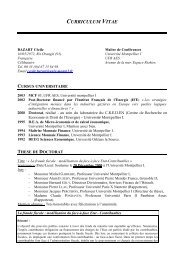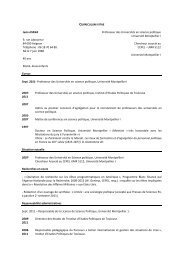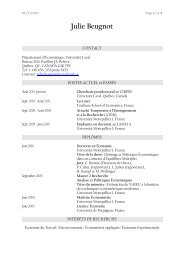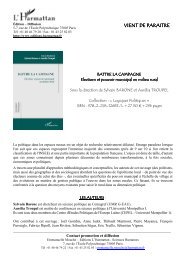COLLECTIVE INTEREST VS - Lameta
COLLECTIVE INTEREST VS - Lameta
COLLECTIVE INTEREST VS - Lameta
Create successful ePaper yourself
Turn your PDF publications into a flip-book with our unique Google optimized e-Paper software.
and requires some clarification. While utility is the basis of what is and what ought tobe, the ‗is‘ and the ‗ought‘ do not always coincide. The distinction might even beconsidered as evidence of a contradiction. 12 Without committing ourselves to suchextreme positions, the links between the normative and the positive aspects ofutilitarianism have been questioned by utilitarians and their commentators fromdifferent perspectives: the difference between psychological hedonism, and universalhedonism (Sidgwick, 1874; Guidi, 2007); the role of egoism or self-interest (Vergara,1998; Mongin and Sigot, 1999); individual or extra-individual prudence (Halévy,1905); the distinction between the economic and the politic domain (Halévy, 1901;Sigot, 2000); the role of State (Sigot, 1993); the individual and the collective aspect ofthe utility principle (Sigot, 1993, 2001); the distinction between a moral utilityfunction and a personal utility function (Harsanyi, 1955; 1992); the issue oflaundering preferences (Goodin, 1986), or, more generally, the choice of a model ofutility suited to the ethical project (Broome, 1991; Haslett, 1990). Nevertheless, if allof these positions establish—or negate—the existence of a contradiction, none ofthem confronts the persistence of such an opposition. Beyond the mereacknowledgement of a contradiction or of a distinction, a formal differentiationbetween the ‗is‘ and the ‗ought‘ is thought to be necessary, raising the question oftheir controversial link. Here we intend to discuss the development of this debateconcerning tensions and analytical links between the ‗is‘ and the ‗ought‘ by referenceto utilitarian theories of justice, taking Bentham‘s utilitarianism as a fundamentalreference. We shall now introduce our approach to the problem, and demonstratethat it will also require consideration of the link between private and collective levels.The distinction between the ‗is‘ and the ‗ought‘ acknowledges a divide that does exist,but which should not be allowed to persist. It exists because individuals, acting inaccordance with their own happiness, do not always act in such a way that thecollective interest 13 is maximised. The ‗is‘ and the ‗ought‘ may therefore be inconflict, 14 yet imply no inconsistency in Bentham‘s utilitarianism (see Guidi, 2004). As12 See for instance Harrison (1977: 654): ―Mr. Parekh also claims, rather darkly (p.116), that Benthamgave no reason for holding that ‗personal and political life should both be regulated by the sameprinciple‘.‖ See also the position of Friedman (1948) who points out Bentham‘s ―refusal to see thereality of conflict between the individual interest and that of the community.‖13 I will not here discuss the difficulties of determining what ―interest‖ is in actual situations. See Laval(1993). I will employ a minimalist definition of ―interest‖, as what is good for the individual or thecommunity.14 ―But does not the moralist consider himself necessarily condemned to resolve this absurd problem:in a society in which each individual is necessarily selfish, how can one nonetheless render alldisinterested?‖ Trans. ―Mais alors le moraliste ne se voit-il pas condamné, par profession, à résoudre ce4


